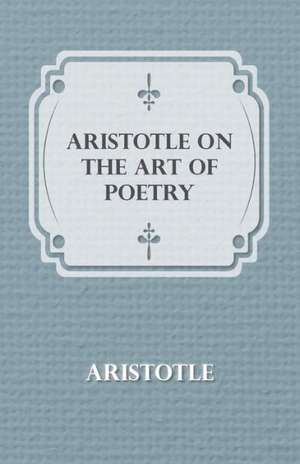Aristotle on the Art of Poetry
Autor Aristotleen Limba Engleză Paperback – 29 iun 2008
| Toate formatele și edițiile | Preț | Express |
|---|---|---|
| Paperback (2) | 91.67 lei 3-5 săpt. | |
| CreateSpace Independent Publishing Platform – | 91.67 lei 3-5 săpt. | |
| Martin Press – 29 iun 2008 | 182.43 lei 6-8 săpt. |
Preț: 182.43 lei
Nou
Puncte Express: 274
Preț estimativ în valută:
34.91€ • 36.45$ • 28.83£
34.91€ • 36.45$ • 28.83£
Carte tipărită la comandă
Livrare economică 15-29 aprilie
Preluare comenzi: 021 569.72.76
Specificații
ISBN-13: 9781409782452
ISBN-10: 140978245X
Pagini: 92
Dimensiuni: 140 x 216 x 6 mm
Greutate: 0.13 kg
Editura: Martin Press
ISBN-10: 140978245X
Pagini: 92
Dimensiuni: 140 x 216 x 6 mm
Greutate: 0.13 kg
Editura: Martin Press
Notă biografică
Aristotle (Greek: ¿¿¿¿¿¿¿¿¿¿¿ Aristotél¿s, pronounced [aristotél¿¿s]; 384-322 BC)[A] was a Greek philosopher and polymath during the Classical period in Ancient Greece. Taught by Plato, he was the founder of the Lyceum, the Peripatetic school of philosophy, and the Aristotelian tradition. His writings cover many subjects. including physics, biology, zoology, metaphysics, logic, ethics, estheticspoetry, theatre, music, rhetoric, psychology, linguistics, economics, politics, and government. Aristotle provided a complex synthesis of the various philosophies existing prior to him. It was above all from his teachings that the West inherited its intellectual lexicon, as well as problems and methods of inquiry. As a result, his philosophy has exerted a unique influence on almost every form of knowledge in the West and it continues to be a subject of contemporary philosophical discussion.
Little is known about his life. Aristotle was born in the city of Stagira in Northern Greece. His father, Nicomachus, died when Aristotle was a child, and he was brought up by a guardian. At seventeen or eighteen years of age he joined Plato's Academy in Athens and remained there until the age of thirty-seven (c. 347 BC).[4] Shortly after Plato died, Aristotle left Athens and, at the request of Philip II of Macedon, tutored Alexander the Great beginning in 343 BC.[5] He established a library in the Lyceum which helped him to produce many of his hundreds of books on papyrus scrolls. Though Aristotle wrote many elegant treatises and dialogues for publication, only around a third of his original output has survived, none of it intended for publication.[6]
Aristotle's views on physical science profoundly shaped medieval scholarship. Their influence extended from Late Antiquity and the Early Middle Ages into the Renaissance, and were not replaced systematically until the Enlightenment and theories such as classical mechanics. Some of Aristotle's zoological observations found in his biology, such as on the hectocotyl (reproductive) arm of the octopus, were disbelieved until the 19th century. His works contain the earliest known formal study of logic, studied by medieval scholars such as Peter Abelard and John Buridan. Aristotle's influence on logic also continued well into the 19th century.
